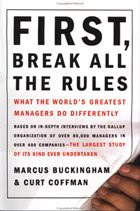So often I find myself talking with, presenting to, emailing, or training leaders that have some of the following issues:
- Poor attitudes
- Afraid to speak up, especially in a group
- Sit in training with arms folded over chest
- Poor communications with everyone (even family members)
- Do not participate (group discussion, training exercises, etc.)
- Not happy to be anywhere
I am amazed that so-called leaders would select someone to manage people if they are struggling with any of these problems. Here is a quote from an excellent book, "First, Break all the Rules" published by the Gallup organization.

"A manager has got to remember that he is on a stage every day. His people are watching him. Everything he does, everything he says, and the way he says it, sends off clues to his employees. These clues affect performance. So never forget you are on that stage. Talented employees need great managers. They may join a company because of its charismatic leaders, its generous benefits, and its world-class training programs, but how long that employee stays and how productive he is while he is there is determined by his relationship with his immediate supervisor."
What these managers and supervisors need more than anything is a better leader themselves.


